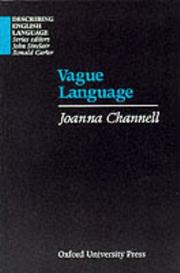| Listing 1 - 3 of 3 |
Sort by
|
Book
ISBN: 9780198782889 0198782888 Year: 2016 Publisher: Oxford : Oxford University Press,
Abstract | Keywords | Export | Availability | Bookmark
 Loading...
Loading...Choose an application
- Reference Manager
- EndNote
- RefWorks (Direct export to RefWorks)
"Vague expressions are omnipresent in natural language. As such, their use in legal texts is virtually inevitable. If a law contains vague terms, the question whether it applies to a particular case often lacks a clear answer. One of the fundamental pillars of the rule of law is legal certainty. The determinacy of the law enables people to use it as a guide and places judges in the position to decide impartially. Vagueness poses a threat to these ideals. In borderline cases, the law seems to be indeterminate and thus incapable of serving its core rule of law value. In the philosophy of language, vagueness has become one of the hottest topics of the last two decades. Linguists and philosophers have investigated what distinguishes 'soritical' vagueness from other kinds of linguistic indeterminacy, such as ambiguity, generality, open texture, and family resemblance concepts. There is a vast literature that discusses the logical, semantic, pragmatic, and epistemic aspects of these phenomena. Bringing together leading scholars working on the topic of vagueness in philosophy and in law, this book fosters a dialogue between philosophers and legal scholars by examining how philosophers conceive vagueness in law from their theoretical perspective and how legal theorists make use of philosophical theories of vagueness."
Law --- Rechtsphilosophie. --- Rechtstheorie. --- Vagheit. --- Vagueness (Philosophy). --- Interpretation and construction. --- Language.
Book
ISBN: 3957437547 3957431972 Year: 2020 Publisher: Paderborn Brill | mentis
Abstract | Keywords | Export | Availability | Bookmark
 Loading...
Loading...Choose an application
- Reference Manager
- EndNote
- RefWorks (Direct export to RefWorks)
This book examines philosophical approaches to linguistic vagueness, a puzzling feature of natural language that gives rise to the ancient Sorites Paradox and challenges classical logic and semantics.The Sorites, or Paradox of the Heap, consists in three claims: (1) One grain of sand does not make a heap. (2) One billion grains of sand do make a heap. (3) For any two amounts of sand differing by at most one grain: either both are heaps of sand, or neither one is. The third claim is rendered plausible by an initial conviction that vague predicates like 'heap' tolerate small changes. However, the repeated application of a tolerance principle to the second claim yields the further proposition that one grain of sand does make a heap - which contradicts claim number one. Consequently, many philosophers reject or modify tolerance principles for vague predicates. Inga Bones reassesses prominent responses to the Sorites and defends a Wittgensteinian dissolution of the paradox. She argues that vague predicates are, indeed, tolerant and discusses how this finding relates to the paradox itself, to the notion of validity and to the concept of a borderline case.
Paradox des Haufens --- Vagheit --- Unbestimmtheit --- Wittgenstein --- Philosophie der normalen Sprache --- Paradox of the Heap --- Vagueness --- Indeterminacy --- Ordinary Language Philosophy

ISBN: 0194371867 9780194371865 Year: 1994 Publisher: Oxford Oxford University Press
Abstract | Keywords | Export | Availability | Bookmark
 Loading...
Loading...Choose an application
- Reference Manager
- EndNote
- RefWorks (Direct export to RefWorks)
This is a major descriptive study of linguistic vagueness. It argues that strategies for being vague constitute a key aspect of the communicative competence of the native speaker of English.
English language --- Pragmatics --- Anglais (Langue) --- Spoken English --- Semantics --- Anglais parlé --- Sémantique --- Linguistique --- --Langue anglaise --- --Pragmatisme --- 3321 --- Anglais (langue) --- Ambiguïté --- Langage et logique --- Usage --- #KVHA:Pragmatiek; Engels --- Anglais parlé --- Sémantique --- Ambiguïté. --- Langage et logique. --- Usage. --- --Anglais (langue) --- --#KVHA:Pragmatiek; Engels --- Langue anglaise --- Pragmatisme --- Language and logic. --- Ambiguity. --- 18.04 English language. --- Englisch. --- Semantik. --- Vagheit. --- Vaagheid. --- Taalgebruik. --- Engels. --- Meaning (Philosophy). --- Discourse analysis. --- Style.
| Listing 1 - 3 of 3 |
Sort by
|

 Search
Search Feedback
Feedback About UniCat
About UniCat  Help
Help News
News